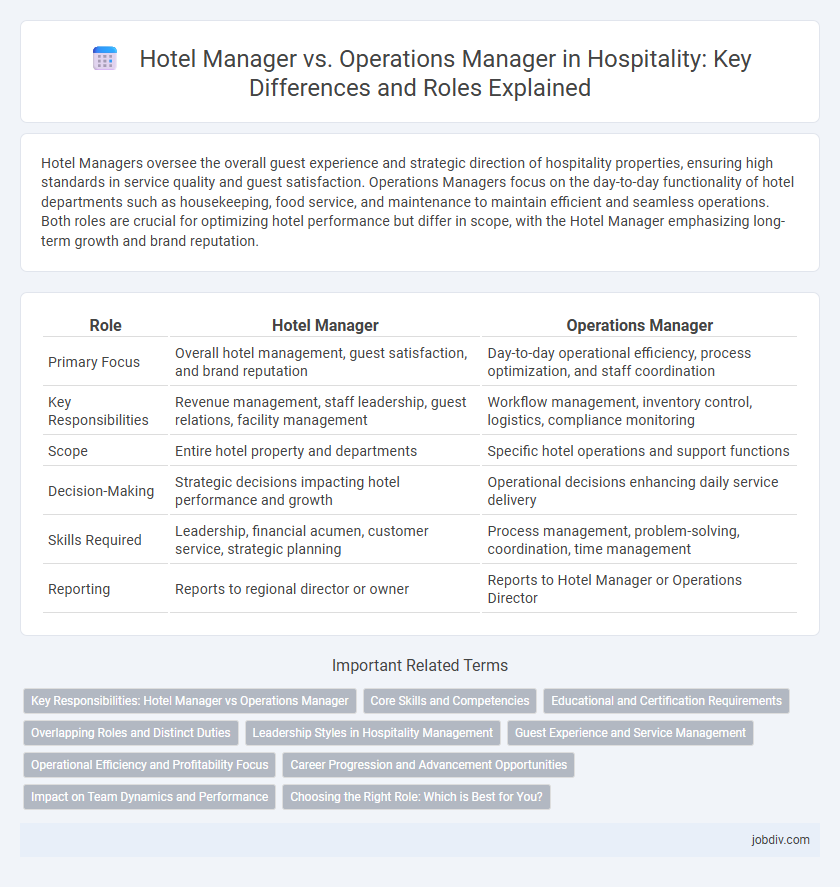Hotel Managers oversee the overall guest experience and strategic direction of hospitality properties, ensuring high standards in service quality and guest satisfaction. Operations Managers focus on the day-to-day functionality of hotel departments such as housekeeping, food service, and maintenance to maintain efficient and seamless operations. Both roles are crucial for optimizing hotel performance but differ in scope, with the Hotel Manager emphasizing long-term growth and brand reputation.
Table of Comparison
| Role | Hotel Manager | Operations Manager |
|---|---|---|
| Primary Focus | Overall hotel management, guest satisfaction, and brand reputation | Day-to-day operational efficiency, process optimization, and staff coordination |
| Key Responsibilities | Revenue management, staff leadership, guest relations, facility management | Workflow management, inventory control, logistics, compliance monitoring |
| Scope | Entire hotel property and departments | Specific hotel operations and support functions |
| Decision-Making | Strategic decisions impacting hotel performance and growth | Operational decisions enhancing daily service delivery |
| Skills Required | Leadership, financial acumen, customer service, strategic planning | Process management, problem-solving, coordination, time management |
| Reporting | Reports to regional director or owner | Reports to Hotel Manager or Operations Director |
Key Responsibilities: Hotel Manager vs Operations Manager
Hotel Managers oversee overall guest experience, staff management, and financial performance to ensure the hotel's reputation and profitability. Operations Managers focus on daily operational efficiency, including housekeeping, maintenance, and food service coordination, to maintain smooth workflows. Both roles require leadership and problem-solving skills but differ in scope, with Hotel Managers handling strategic decisions and Operations Managers managing tactical execution.
Core Skills and Competencies
Hotel Managers excel in guest relations, revenue management, and strategic planning, ensuring exceptional customer experiences and profitability. Operations Managers possess strong organizational skills, process optimization expertise, and team leadership abilities to maintain efficient daily hotel functions. Both roles require exceptional communication and problem-solving skills but differ in focus: Hotel Managers prioritize guest satisfaction and business growth, while Operations Managers emphasize operational efficiency and staff coordination.
Educational and Certification Requirements
Hotel Managers typically require a bachelor's degree in hospitality management, business administration, or a related field, complemented by certifications such as Certified Hotel Administrator (CHA) to enhance professional credibility. Operations Managers in hospitality often hold degrees in business management or operations, with certifications like Certified Operations Manager (COM) or Six Sigma Green Belt to demonstrate expertise in process optimization. Both roles benefit from continuous education and industry-specific training to stay updated on hospitality trends, regulatory standards, and management best practices.
Overlapping Roles and Distinct Duties
Hotel Managers oversee overall guest experience, strategic planning, and staff leadership, ensuring the property meets brand standards and financial goals. Operations Managers focus on daily departmental coordination, process optimization, and resource allocation to maintain efficient service delivery and operational workflows. Both roles require collaboration in managing staff and service quality, but Hotel Managers drive long-term vision while Operations Managers handle tactical execution.
Leadership Styles in Hospitality Management
A Hotel Manager often adopts a transformational leadership style, inspiring staff through vision and fostering a customer-centric culture critical for guest satisfaction. In contrast, an Operations Manager typically employs a transactional leadership approach, focusing on process efficiency, task delegation, and performance metrics to optimize day-to-day hotel functions. Effective hospitality management integrates both leadership styles to balance strategic guest experience initiatives with operational excellence.
Guest Experience and Service Management
Hotel Managers oversee overall guest experience strategies, ensuring seamless service quality and satisfaction through staff coordination and facility management. Operations Managers focus on daily service management, optimizing workflows and resource allocation to maintain consistent operational efficiency in guest services. Both roles collaborate closely to enhance customer satisfaction and uphold high standards in hospitality service delivery.
Operational Efficiency and Profitability Focus
Hotel managers concentrate on overseeing the entire property, ensuring guest satisfaction while optimizing room occupancy and service quality, directly impacting revenue streams. Operations managers focus on streamlining day-to-day departmental functions such as housekeeping, maintenance, and food services to reduce costs and enhance workflow efficiency. The collaboration between these roles fosters operational efficiency and profitability by aligning strategic management with effective resource utilization.
Career Progression and Advancement Opportunities
Hotel Managers typically oversee overall property performance, focusing on guest satisfaction, staff management, and financial goals, which positions them for senior leadership roles such as General Manager or Regional Director. Operations Managers concentrate on streamlining daily processes, managing departments like housekeeping and maintenance, providing a strong foundation for advancement into specialized roles or broader operational leadership. Career progression for both roles depends on demonstrated leadership, industry experience, and the ability to implement strategic improvements that enhance efficiency and guest experience.
Impact on Team Dynamics and Performance
Hotel Managers directly influence team dynamics by fostering a guest-centric culture that enhances employee motivation and service quality. Operations Managers optimize performance through streamlined processes and resource allocation, ensuring efficient workflow and reduced operational bottlenecks. Collaboration between both roles drives cohesive teamwork and elevated overall hotel performance.
Choosing the Right Role: Which is Best for You?
Hotel Managers oversee overall guest experience, financial performance, and staff coordination, making strategic decisions to enhance service quality and profitability. Operations Managers focus on daily functional management, streamlining processes, supply chain logistics, and facility maintenance to ensure smooth operational efficiency. Choose a Hotel Manager role if you prefer leadership with a broad vision and guest interaction, while Operations Manager suits those who excel in process optimization and behind-the-scenes management.
Hotel Manager vs Operations Manager Infographic

 jobdiv.com
jobdiv.com